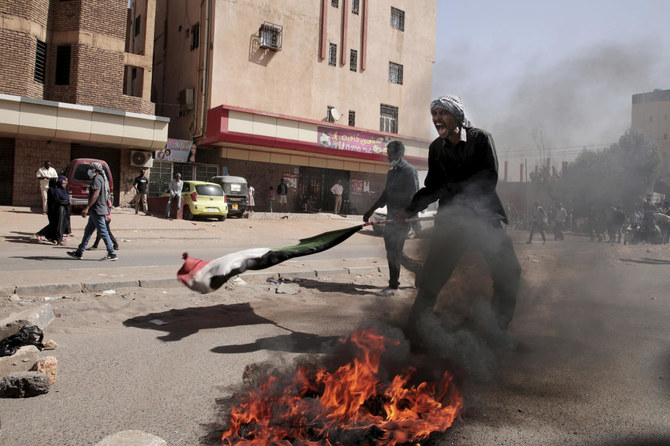Sudan protester shot dead as US envoys visit
KHARTOUM: Sudanese security forces shot dead an anti-coup protester on Wednesday as American diplomats visited Khartoum seeking to help end a crisis which has claimed dozens of lives and derailed the country’s democratic transition.
For two days shops have shuttered and protesters have blockaded streets in a civil disobedience campaign to protest the killing of seven people during a demonstration on Monday, one of the bloodiest days since the October 25 military coup.
The latest killing took place in Khartoum’s twin city of Omdurman where protesters opposed to the coup had set up barricades.
Pro-democracy medics from the Doctors’ Committee said the protester was shot in the torso “by live bullets of the (security) forces.”
Witnesses also reported the use of tear gas by security forces in Omdurman and eastern Khartoum.
The death brings to 72 the number of people killed in a security crackdown against protesters who have taken to the streets — sometimes in the tens of thousands — calling for a return to the country’s democratic transition and opposing the latest military putsch.
Protesters have been shot by live rounds and hundreds have been wounded, according to the Doctors’ Committee.
The Forces for Freedom and Change, the leading civilian pro-democracy group, called for more protests on Thursday in Khartoum “in tribute to the martyrs,” and nationwide on Friday.
Before the latest fatality, US Assistant Secretary of State Molly Phee and special envoy for the Horn of Africa, David Satterfield, held meetings with the bereaved families of people killed during the protests, the US embassy said.
They also met with members of the Sudanese Professionals Association (SPA), an umbrella of unions which were instrumental in protests which ousted president Omar Al-Bashir in April 2019, as well as the mainstream faction of the Forces for Freedom and Change.
Its spokesman Wagdy Saleh said they pleaded for “an end to the systematic violence toward civilians” and a “credible political process.”
The diplomats are scheduled to meet with others including military leaders and political figures.
“Their message will be clear: the United States is committed to freedom, peace, and justice for the Sudanese people,” the US State Department said ahead of the visit.
The diplomats held earlier talks in Saudi Arabia with the “Friends of Sudan” — a group of Western and Arab countries favoring transition to civilian rule.
In a statement, the group backed a United Nations initiative announced last week to hold intra-Sudanese consultations to break the political impasse.
“We urge all to engage in good faith and reestablish public trust in the inevitable transition to democracy,” the group said.
“Ideally this political process will be time-bound and culminate in the formation of a civilian-led government which will prepare for democratic elections.”
While the US diplomats visited, coup leader General Abdel Fattah Al-Burhan announced that vice-ministers — some of whom served before the coup and some appointed after — would now become ministers.
A statement from his office called it a “cabinet in charge of current affairs.”
But it has no prime minister, since the civilian premier Abdalla Hamdok resigned in early January after trying to cooperate with the military.
As part of the civil disobedience campaign, judicial workers including prosecutors and judges said they would not work for a state committing “crimes against humanity.”
University professors, corporations and doctors also joined the movement, according to separate statements.
Sudan’s authorities have repeatedly denied using live ammunition against demonstrators, and insist scores of security personnel have been wounded during protests. A police general was stabbed to death last week.

Sudanese barricade streets, staging rallies in protest against coupFriends of Sudan convene in Riyadh to discuss ways to assist UN mission



